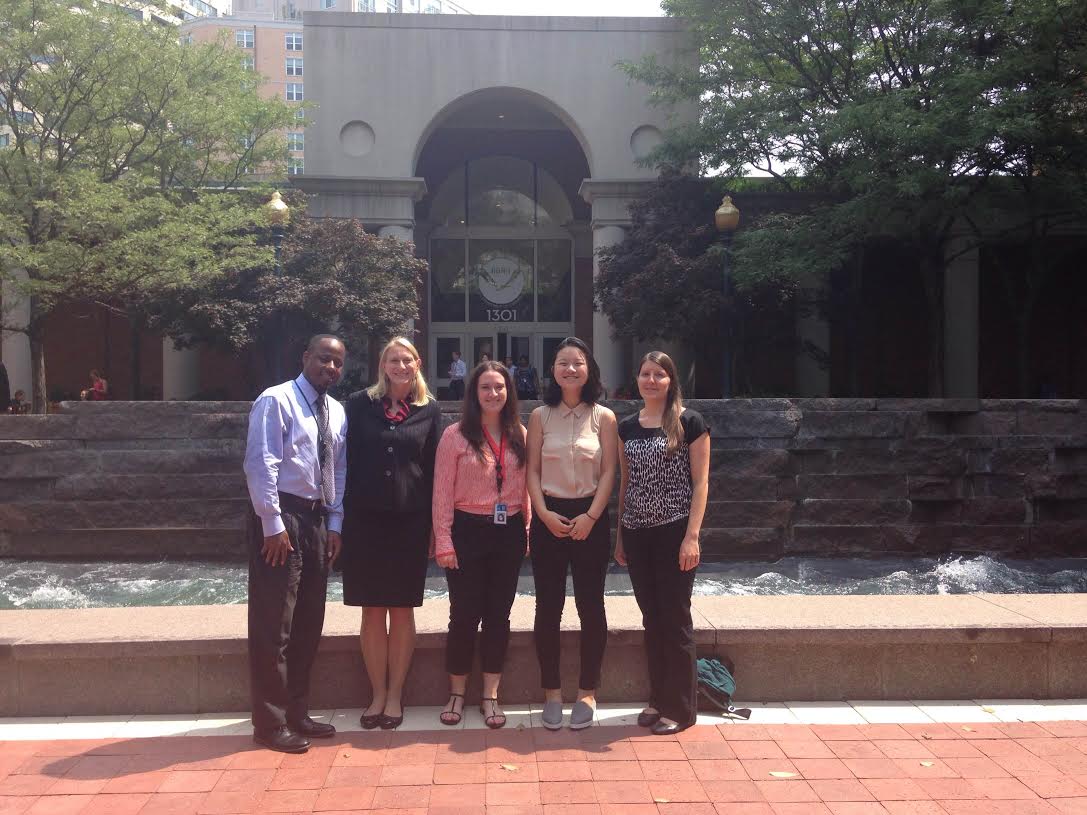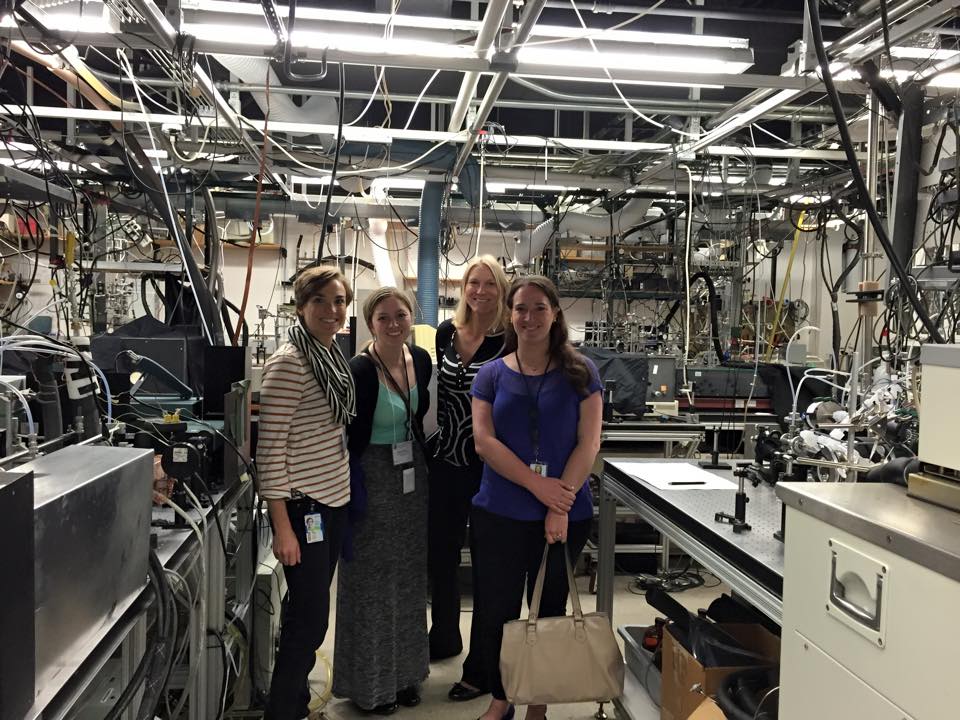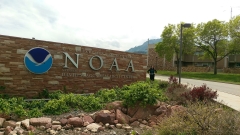Knauss legislative fellowships in Congress help build careers — and they're fun and educational. See our video and fact sheet for details.
Embracing Your Inner Imposter
It was my first day on the job as a new Knauss Marine Policy Fellow. Was accepting this position a mistake?
I didn’t even have a working computer yet, but the 2016 President’s Budget had just been released and I was asked to edit anything that didn’t make sense in a stack of PowerPoint slides that my office handed me. You see, I had been placed in the Office of Formulation and Congressional Analysis for NOAA’s Office of Oceanic and Atmospheric Research (OAR), the office that is responsible for creating OAR’s proposed research budget and justifying it to Congress. My new office was preparing briefing materials to take to Capitol Hill, and this presentation was the carefully crafted message OAR leadership would present later that week in February.
I knew little to nothing about NOAA, let alone OAR. And I was going to edit and change this message that had been months in the making? It was time to cue my inner imposter.
Even if you have never heard of “imposter syndrome,” I am sure you know what I mean. It’s that worried feeling you get that makes you question whether you’re prepared for the job at hand. You start to think that maybe you aren’t actually smart enough or competent enough, and that somehow you have managed to fool others into thinking you are more intelligent and capable than you really are. It can be a devastating blow to your ego to suddenly find yourself in a situation you are not sure you are entirely prepared to handle.
 |
| Brittany Marsden with members of her host office. Pictured, left to right: Elliot Forest, Merriam Norris, Brittany Marsden, Kim Lu, and Emily Gamelin. |
Graduate school was full of these situations for me. My head seemed always full of questions about whether my research was rigorous enough, novel enough, and theoretical enough while also being practical and applicable enough. The graduate-school process reinforces this feeling – it’s actually the job of your committee to question you during your qualifying exams until … you don’t know the answer! Logically, I knew they were just testing the limits of my knowledge, but it was still emotionally unsettling to stand in front of a group of mentors and advisors I wanted to prove myself to and hear the words “I don’t know” fall from my mouth. I felt embarrassed and almost un-deserving when my committee told me I had passed, and I hate feeling that way. So what did I do after grad school? I took the Knauss Marine Policy Fellowship and put myself right back into a landscape where “I don’t know” is a very common feeling.
For example, in my first two months I took leading OAR scientists to Capitol Hill so they could meet with members of Congress and their staff to talk about the importance and impact of NOAA research. I then found myself organizing and conducting management reviews of all of the OAR labs and programs spread across the country. For these reviews I collaborated with offices across OAR, met with the lab and program directors, and traveled to the Earth System Research Lab in Boulder, the Pacific Marine Environmental Lab in Seattle, and the Atlantic Oceanographic & Meteorological Lab in Miami. All very exciting, but who was I to be doing all these things? Imposter.
These moments when my inner imposter crept up became a crossroads. I could either worry about not having all the right background training, or I could embrace my inner imposter and realize that, you know what? – I don’t know…yet! Opportunities in unfamiliar territory are endless in my host office because any given day might start with something like drafting a response to a congressional inquiry on deep sea exploration research and end with reaching out to scientists to collect information for a new proposal on coupling atmospheric and oceanic models to improve drought forecasting. I have been embracing these moments now for the learning experiences they are and have been rewarded to discover that my input is valued in return. I am learning that one of my greatest strengths is that I am a quick learner on a wide variety of science topics and that one of the skills I picked up in graduate school is the ability to present high-quality research in an accessible way.
 |
|
Brittany Marsden with other 2015 Knauss Fellows touring the Chemical Sciences Division of the Earth System Research Lab in Boulder, Colorado. Pictured, left to right: Caroline Mosley, Jessica Foley, Merriam Norris (OAR FCA Director), and Brittany Marsden. Credit: Andrea Badder |
One of the best parts of the fellowship is that I am surrounded by a cohort of unbelievably talented people who are just as crazy as I am because, like me, they decided to jump outside of their comfort zones. Rather than letting these talented people make me feel like an imposter, they are helping me grow more confident as I learn as much from my fellow fellows as from my incredibly supportive host office.
Life, in general, is an ongoing series of new experiences, pushing that threshold between where your knowledge ends and where new discovery begins. Only by getting comfortable with being uncomfortable, and even embracing that feeling, can we use it to our advantage. I guess back in grad school that was why our advisors put us though the academic “hazing” known as qualifying exams – because as scientists, we need to be comfortable living on the edge of our understanding.
As a fellow, I truly began as an outsider at NOAA. I didn’t know the language, and I was new to the world of government, Congress, appropriations, and authorizations. I was literally given the opportunity to perform a job that I could have never otherwise landed because I had no “pervious experience” for it. But that created opportunities for me to provide input in a fresh way.
Nine months in, I feel like a valued and valuable member of my team. The once-confusing acronym soup that washed over every meeting now feels like a part of my own vocabulary. I also feel strongly connected to the extensive network of Knauss Fellowship alumni, so there are emerging opportunities every day to step outside my comfort zone and continue to embrace my inner imposter.
Photo, top left: Brittany Marsden, visiting the Earth System Research Lab in Boulder, Colorado. Credit: Jessica Foley
See all posts to the Fellowship Experiences blog

